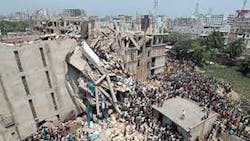SAVAR, Bangladesh - The death toll from Bangladesh's worst industrial disaster surpassed 700 after dozens more bodies were pulled from the wreckage of a nine-storey building that housed garment factories.
Search teams said the toll would almost certainly rise since debris had only been cleared down to the fifth floor of the pancaked building, and a strong stench from lower floors suggested more bodies would be found.
Lieutenant Imran Khan of the army control room coordinating the rescue said the confirmed death toll now stands at over 700.
The Rana Plaza building, which housed five garment factories, collapsed at Savar near the capital Dhaka on April 24.
More than 3,000 people, mostly women workers sewing clothing for Western brands such as Mango, Benetton and Primark, were working inside at the time.
Police have charged the building owner Sohel Rana and five factory owners with causing death due to negligence and violating construction laws, charges punishable by a maximum seven years in jail.
The wife of a male garment worker killed in the disaster has also filed a murder complaint against Rana, one of the garment factory owners and a municipal engineer.
Senior judicial magistrate Wasim Sheikh Sunday accepted the complaint by Sheuli Akter and ordered an investigation, police Inspector Mohammad Asaduzzaman said, adding the three face death by hanging if convicted of murder.
Rana, a local leader of the ruling Awami League political party, was arrested after a four-day hunt as he tried to flee to India.
Hundreds of distraught relatives gathered at the site Sunday as cranes and bulldozers cut through a mountain of concrete and mangled steel.
Officials said some bodies pulled from the wreckage have missing limbs and some have decomposed, delaying identification.
"We've identified only a handful of them by their mobile phones that were found in their pockets or identity cards given by the factories," said deputy administrator of Dhaka district, Zillur Rahman Chowdhury.
Commerce Secretary Mahbub Ahmed late Saturday reiterated pledges to "inspect all garment factory buildings" as Bangladesh faces pressure from Western brands to clean up an industry with a shocking accident record.
The government made a similar announcement after a devastating fire exactly five months ago killed 111 garment workers, but the subsequent inspections were widely derided as insufficient.
Ahmed urged buyers and top trade partners such as the European Union, where nearly 60% of Bangladesh's clothing is shipped, not to shun Dhaka's products. He said any boycott would hurt the country's 60 million poor.
A preliminary government probe has said the collapse was caused by vibrations from four giant generators on the compound's upper floors. The building's architect, Masood Reza, said he designed the structure to house a shopping mall and offices, not factories.
UK retailer Primark, Italy's Benetton and Spanish firm Mango have admitted they had placed orders with the factories based in the compound, triggering an angry response in many Western countries.
Bangladesh is the world's second-largest garment exporter after China. The industry accounts for 80% of the country's exports and more than 40% of its industrial workforce.
-Kamrul Hasan Khan, AFP
Copyright Agence France-Presse, 2013
About the Author
Agence France-Presse
Copyright Agence France-Presse, 2002-2025. AFP text, photos, graphics and logos shall not be reproduced, published, broadcast, rewritten for broadcast or publication or redistributed directly or indirectly in any medium. AFP shall not be held liable for any delays, inaccuracies, errors or omissions in any AFP content, or for any actions taken in consequence.
